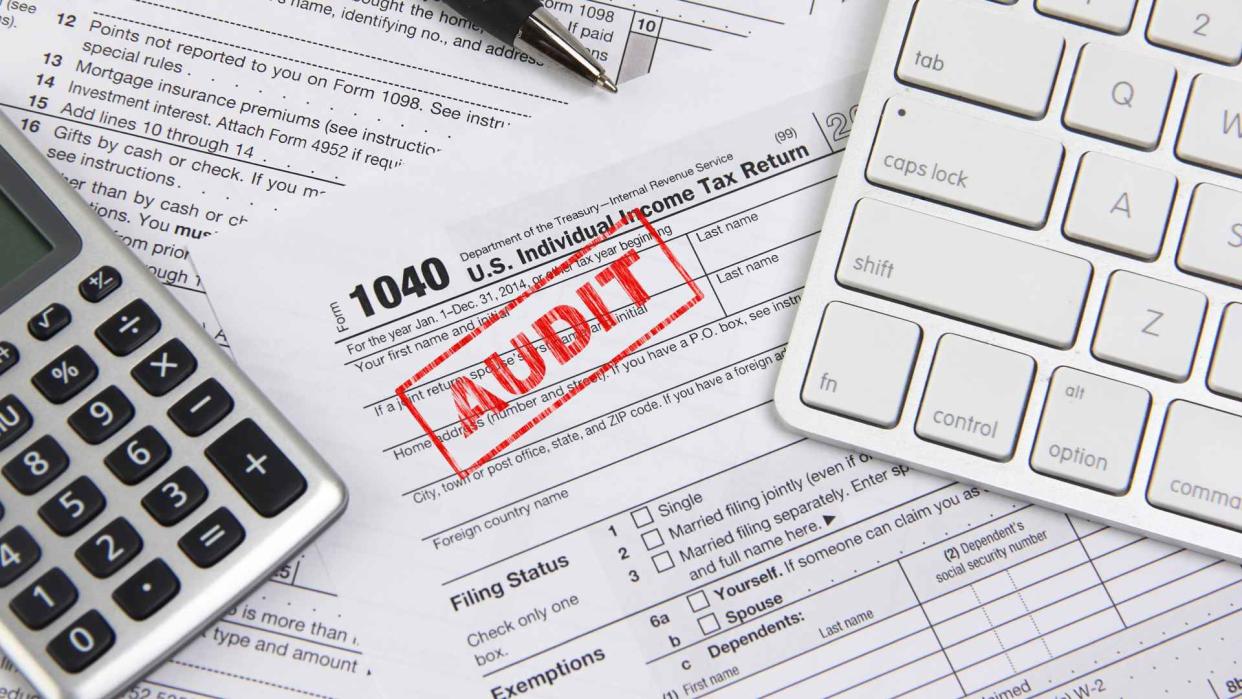I’m an Accountant: Here Are 3 Ways To Prevent a Tax Audit

Although your chances of being audited are very slim — as of tax year 2022, just 0.38% of tax returns triggered an audit — it’s still something you may want to take precautions to avoid. While you can’t predict with certainty whether you will or will not be audited, there are some ways to lower your chances.
Find Out: The 7 Worst Things You Can Do If You Owe the IRS
Read More: Owe Money to the IRS? Most People Don’t Realize They Should Do This One Thing
GOBankingRates spoke with Lisa Greene-Lewis, CPA and TurboTax tax expert, about what you can do to prevent an audit.
Accurately Report Your Income
One of the most common triggers for an audit is intentionally not reporting large amounts of income.
“Unreported income is an easy-to-avoid red flag, but is also easy to overlook,” Greene-Lewis said. “Old brokerage accounts, 1099s and distributions from a college savings account used to pay tuition are commonly overlooked. Sometimes you may not receive a tax form for some income you earned and unintentionally leave it off your tax return. If that is the case, the IRS will adjust your taxes, but if you intentionally leave large amounts of money you earned off your taxes, then that can trigger an audit.”
Learn More: IRS Increases Gift and Estate Tax Exempt Limits — Here’s How Much You Can Give Without Paying
Be Mindful About Foreign Accounts
Money held in foreign accounts comes with its own set of rules.
“The Foreign Account Tax Compliance Act has strict reporting requirements for foreign bank accounts,” Greene-Lewis said. “The law requires overseas banks to identify American asset holders and provide information to the IRS, and individuals are required to report foreign assets worth at least $50,000 on the new Form 8938.”
Be Intentional About What You Report as a Business Expense
Some people blur the lines on business expenses, but this can land you in a hot seat with the IRS.
“The IRS will give a close look to excessive business tax deductions, like private jet usage,” Greene-Lewis said. “The agency uses occupational codes to measure typical amounts of travel by profession, and a tax return showing 20% or more above the norm might get a second look.
“Sometimes returns are selected based solely on a statistical formula,” she continued. “The IRS compares your tax return against ‘norms’ for similar returns. Self-employed and business owners should feel empowered to claim the deductions that are reasonable and directly related to their business — just make sure you keep track of your receipts and document the business purpose.”
How To Be Prepared for an Audit
While these tips can help you avoid an audit, there is still a chance you can be an unlucky filer singled out by the IRS.
“The IRS does not disclose what specifically triggers an audit — all taxpayers can potentially be audited,” said Eric Bronnenkant, CPA, CFP, director, head of tax at Betterment. “The best planning that can be done is to prepare for the possibility of an audit. Maintaining records that properly support income, deductions and credits is the best defense.”
In the event you are audited, Bronnenkant recommends enlisting the help of a professional.
“If you have been notified about an audit, it may be wise to hire a CPA to help represent you before the IRS,” he said.
More From GOBankingRates
Suze Orman: 5 Social Security Facts Every Soon-To-Be Retiree Must Know
Here's How to Add $200 to Your Wallet -- Just For Banking Like You Normally Would
The Biggest Mistake People Make With Their Tax Refund -- And How to Avoid It
This article originally appeared on GOBankingRates.com: I’m an Accountant: Here Are 3 Ways To Prevent a Tax Audit
